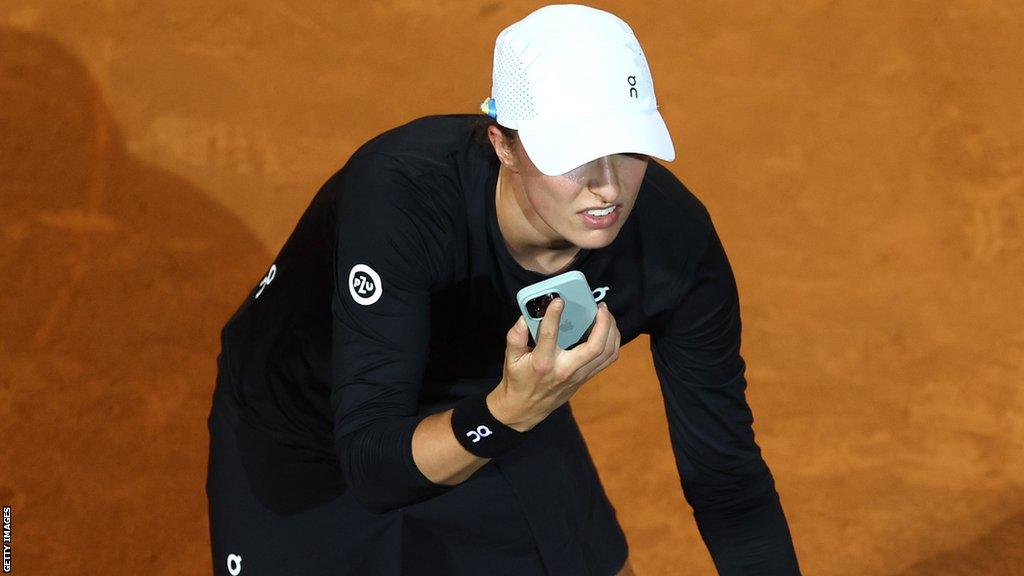French Open 2023: Grand Slam using AI to protect players from online abuse
- Published

Social media allows fans to get closer to their favourite players - but it has a downside
They say don't read the comments - but it is easier said than done.
A lot of tennis players share their lives online, giving followers a glimpse into what happens on the tour. It is a way for fans to feel closer to players, and vice versa.
But for some, after a match - win or lose - the messages take on a very different tone.
Earlier in May, American Taylor Townsend shared a screenshot of the death threat and racist abuse she received in an email.
The catalyst? Townsend's third-round defeat in the Italian Open.
"I think fans would be surprised by some of the things not just you but your family get," world number six Coco Gauff said.
"I think that's why I feel like I've become more private with my life - I don't like to subject my friends and family to that."
This year, French Open organisers have offered players at the tournament artificial intelligence-protection from social media abuse - but what does it do and will players use it?
How is French Open aiming to protect players?
The Bodyguard technology aims to filter out abusive comments on Facebook, Instagram, Twitter, Youtube, Tiktok and Discord.
Players can scan a QR code to connect their social media accounts to its system, with the company stating it analyses every real-time comment in under 200 milliseconds and blocks abusive remarks.
The company states a team of linguists has created word patterns that can be updated in real time that would help it filter out abusive comments, adding: "the aim is to let nothing slip through the net, while being careful not to be too censorial."
The French Open is the first of the four Grand Slams to introduce such a scheme, with French Tennis Federation CEO Caroline Flaissier saying player mental health is a "priority for Roland Garros".
'Probably they were betting on you'
While social media allows players to be more accessible, it also opens them up to a higher level of scrutiny from fans.
Tennis is a near year-round sport, with the amount of matches making it attractive to gamblers.
"Probably they were betting on you. And then they write me this crazy message," said former French Open champion and world number 17 Jelena Ostapenko.
"I don't really care what the people are saying on social media when I lost a match. I can have not a good day, or something was wrong, they don't even know this."
World number one and defending champion Iga Swiatek is one of the players who has signed up to the Bodyguard programme.
"After tournaments I had this ritual of going to see what people thought about my matches. But right now, I stopped doing that," she said.
"I had, I don't know, two tournaments, one I won, the other one I was in the final. I went on social media and people were unhappy because after last year, they thought that I should win everything [or] that I'm getting worse because I'm not winning.
"It frustrated me a little bit and I realised there is no sense to read all that stuff."
Swiatek called the app a "step forward to the right direction".
"It's just sad to see that the thing that was supposed to kind of make us happy and socialised is giving us more negative feelings and thoughts," she said.
"So I think these kind of apps maybe will help us to use social media and not worry about those things."
Last year's runner-up Gauff said that while she admires the French Open for "stepping in and finding ways to protect the players", she will not be using the Bodyguard app as she has already taken action to filter out messages on Instagram.
"I don't really see too many bad messages online, honestly. Before I implemented that [a filter], yes, I would get them on Instagram pretty much daily, hourly," she said.
"I just filter everything - the messages I can only see are people who have followed me for some time. You'd have to be a pretty dedicated person to leave a hate comment - you would have to follow me for a while to do that."
What else is being done to tackle the issue?
Online abuse is not purely a tennis issue - nor is it a new concept.
Four-time Grand Slam champion Naomi Osaka has shared numerous examples of the abuse she has received, while Serena Williams was subjected to constant discussion about her appearance and on-court performance throughout her career.
Football players have increasingly spoken out on the subject, notably after England players Marcus Rashford, Jadon Sancho and Bukayo Saka were racially abused online after the Euro 2020 final defeat by Italy.
A number of clubs and governing bodies boycotted social media platforms in an effort to bring about change.
Social media platforms have said they are committed to tackling abuse, with Instagram introducing a tool in 2021 to enable users to automatically filter out abusive messages from those they do not follow on the platform.
However, more can still be done.
In May, former Olympic champion Monica Puig responded to Townsend's post, calling on the ATP and WTA to do more to protect players.
A WTA spokesperson said the governing body works with a risk assessment and management company to shut down social media accounts when warranted.
"Player safety is the WTA's number one priority," the spokesperson added.
"The WTA has been working for several years to educate and counsel players on this issue, as the number of players affected continues to increase and it's an important issue we take very seriously."